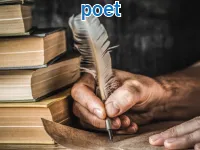
English vocabulary and phrases on Mid-Autumn Festival
poet means . Learn how to pronounce and use poet through vivid examples and easy-to-understand exercises.

Okay, let's break down how to pronounce "poet." It's a tricky one for some! Here's a breakdown with audio resources:
The most common and generally accepted pronunciation is:
Let's break that down:
Here are some helpful resources to hear it:
Common mistakes to avoid:
Tips for practicing:
Would you like me to:
Let's break down how to use the word "poet" effectively in English. It's a word with a rich history and several nuanced ways to employ it.
A poet is a person who writes poems. This is the core definition. It's a simple statement of fact.
The adjective "poetic" is derived from the noun "poet." This is the most common way to use the word in describing qualities, not just roles.
Here’s a table summarizing the usage:
| Form of Word | Meaning/Usage | Example |
|---|---|---|
| Poet (noun) | A writer of poems | "He is a celebrated poet." |
| Poetic (adj.) | Relating to or characteristic of poetry; artistic, evocative | "The sunset had a poetic glow." |
| Poetically | In a poetic manner | "She sang poetically." |
Resources for Further Learning:
To help me give you even more targeted advice, could you tell me:
Which of the following best describes someone who composes verse? A. painter B. poet C. musician D. sculptor
A person skilled in crafting expressive language, often with rhythm, meter, or unique imagery, could be referred to as a: A. essayist B. poet C. versifier D. journalist
Who typically explores themes of human emotion, natural beauty, or philosophical concepts through structured lines and stanzas? A. scientist B. poet C. architect D. engineer
Which of these roles primarily involves writing and performing dramatic scripts intended for theatrical production? A. critic B. playwright C. orator D. biographer
Which term refers to the art of effective or persuasive speaking or writing, especially the use of figures of speech and other compositional techniques? A. orthography B. lexicography C. rhetoric D. epistemology
She dedicated her life to writing lyrical compositions that explored the complexities of the human condition. (Rewrite the sentence using the word "poet".)
The language in his speech was so beautifully expressive and imaginative, it moved the audience deeply. (Rewrite the sentence using a word form related to "poet".)
The individual who meticulously crafts words into intricate, meaningful patterns often possesses a uniquely insightful perspective on life. (Rewrite the sentence using a suitable replacement word for "individual who crafts words" without using "poet" or its derivatives.)
Exercise 1: Fill in the blanks
Exercise 2: Choose the correct answer
Exercise 3: Rewrite the sentences

English vocabulary and phrases on Mid-Autumn Festival

Tips to improve vocabulary in communication

English vocabulary by topic: Clothes

The secret to remembering all 50 English vocabulary words every day easily

English vocabulary by topic: Human body

Vocabulary of the most popular subjects in English

Learn English about Covid: All about vocabulary and disease prevention

Vocabulary of Subjects in English

Set of 60 English vocabulary on educational topics

Vocabulary - just a small thing!
Comment ()